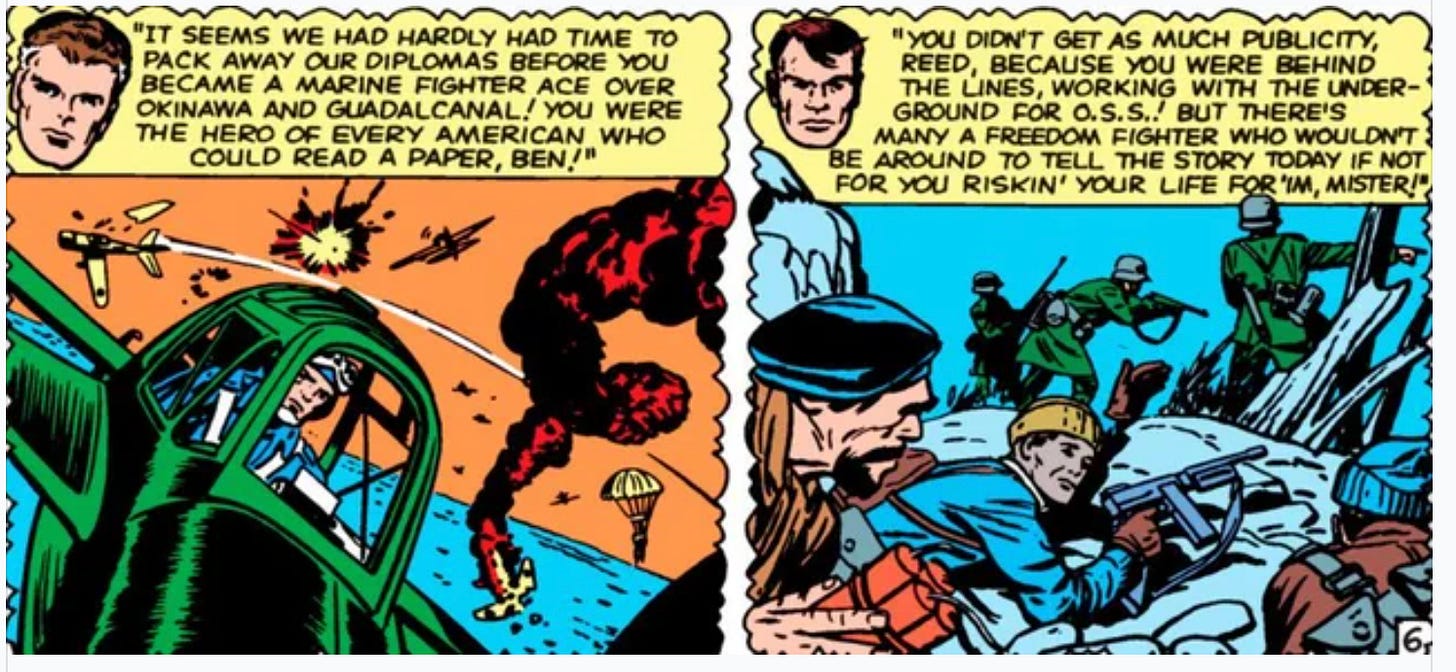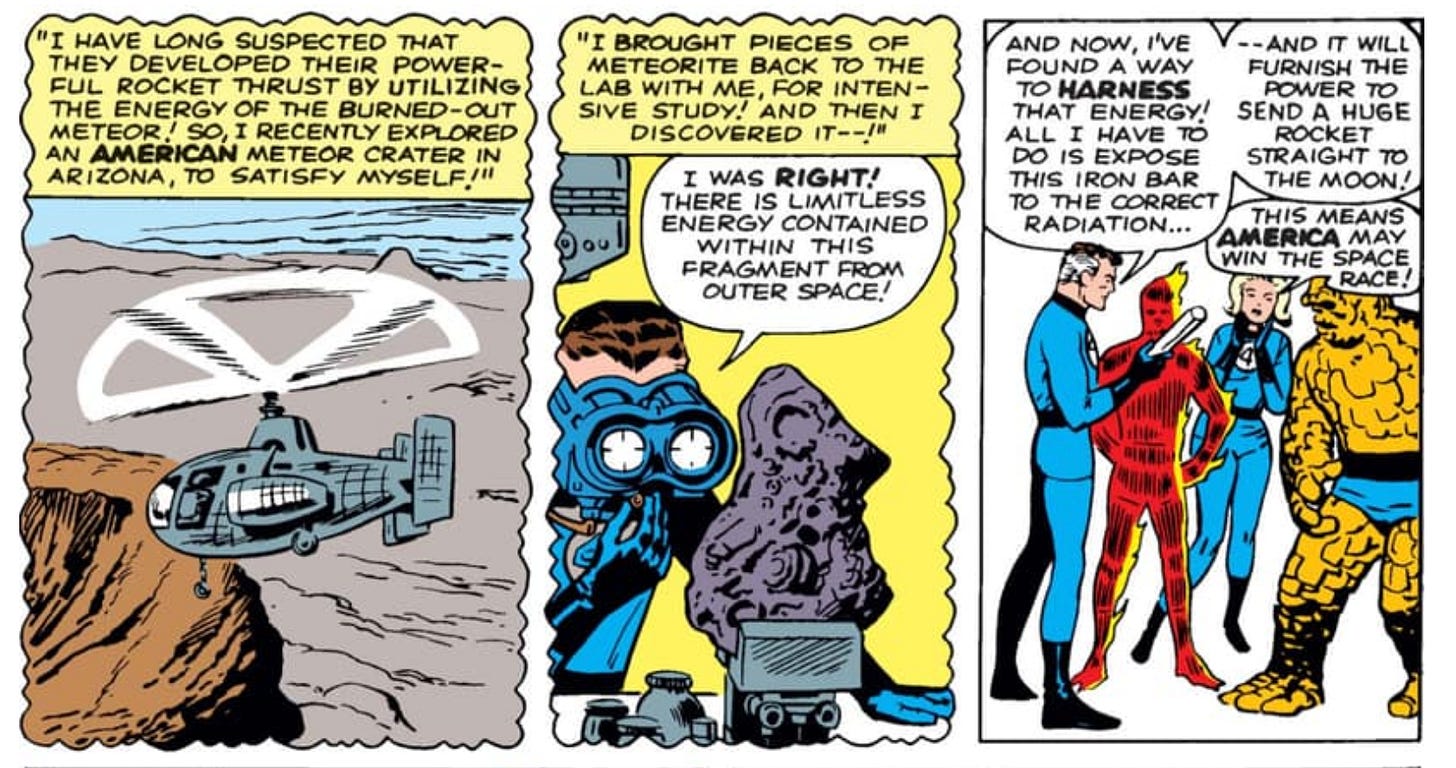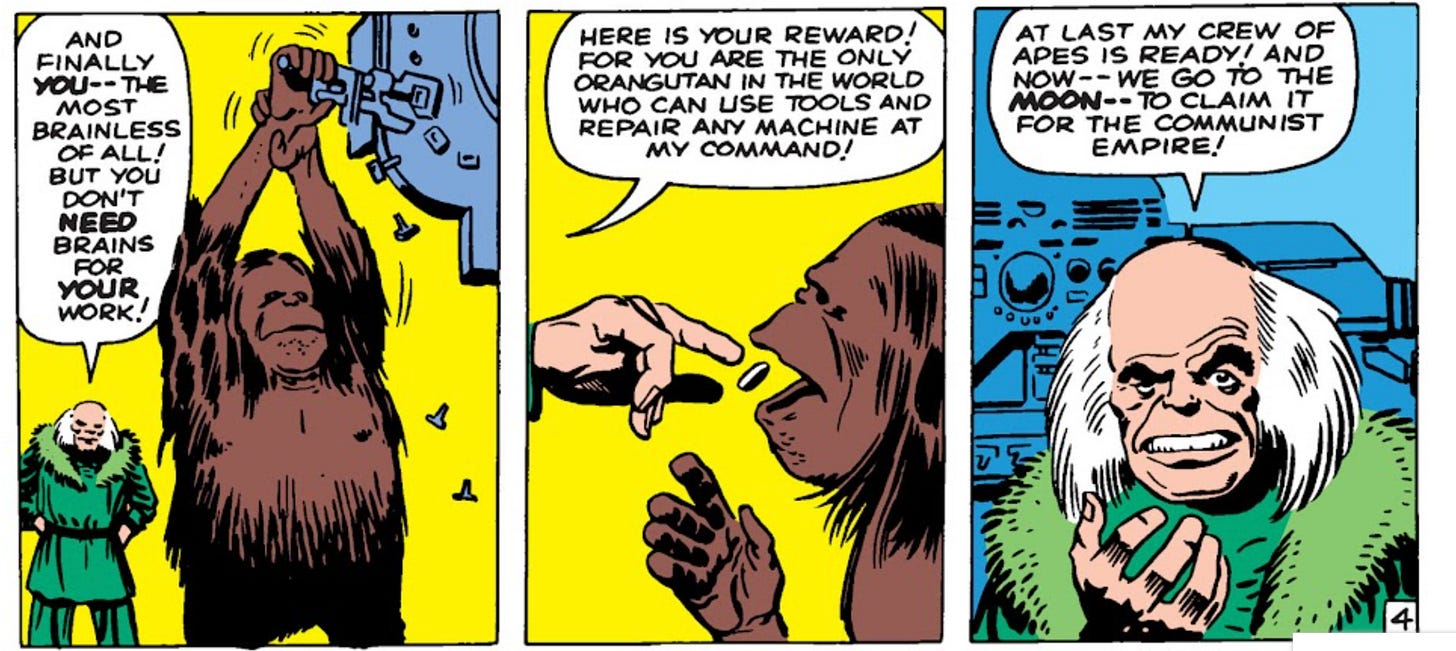The Trouble With The Fantastic Four's Idealized 1960s
These first steps are wobbly.
Fantastic Four: First Steps takes place in an alternate reality “retro-futuristic” 1960s (Earth 828). When I started reading the Fantastic Four comic, the heroes lived in a very 1980s New York City, as drawn by John Byrne. You could almost smell the trash on the streets. And the hairstyles and fashions, especially for the women, were from an early MTV video.
The original 1960s comics by Jack Kirby and Stan Lee were never that overtly Jetsons or had a particular Mad Men vibe, at least no more so than the Superman comics published in the same period. They were just set in the “present.” However, I appreciated that the new film would have a visual aesthetic different from the past film versions. I also enjoyed the “dark deco” look of Batman: The Animated Series, which aired in the 1990s but could have been set in an alternate 1940s/1950s, where there were computers but the TVs were all black-and-white.
Still, while watching the movie, I couldn’t help asking “why?” What makes the world this way? Sue Storm (Vanessa Kirby) is married to Reed Richards (Pedro Pascal) and doesn’t take his name. She is a respected diplomat and runs the Future Foundation, whose chief of staff (Sarah Niles) is a Black woman. That’s all awesome, but there’s no explanation for why racism and sexism simply don’t exist on Earth 828. There is no segregation in this world’s 1960s, but does that mean there was no slavery? If so, are Black Americans descendants of voluntary immigrants who never endured the Middle Passage?
I don’t think humans beings are inherently bigoted. They are capable of making better choices than history would indicate, but without any explanation for why they have, they can feel like characters in a simulation not real people. In the TV series Loki, it’s established that timelines diverge in the multiverse based on individual choice. It’s all about free will. (Watch below.)
So, it would’ve been interesting if First Steps had presented the specific choice or set of choices that changed Earth 828’s reality. Did Abraham Lincoln avoid assassination? Did post-Civil War Reconstruction actually succeed? Was there even a Civil War without slavery? Did Hitler and Nazis exist? That would seem especially relevant considering that Ben Grimm (Ebon Moss-Bachrach) is Jewish and was old enough to have served in World War II, if that took place on this Earth. (Reed and Ben were established as veterans in the original Lee/Kirby comics.)
There was some speculation prior to the film that Reed’s scientific genius had altered the course of history, even before the four took their fateful trip into space. That still doesn’t (and shouldn’t) account for the improved social position of women and minorities.
This also raises question about the women and other minorities in this world’s history. If you set a movie in an idealized 1960s, where is Dr. Martin Luther King Jr., Malcolm X, Fannie Lou Hamer, or Gloria Steinem? Star Trek takes place in a utopian future, but it acknowledges our historical struggles and suggests that they get even worse before they get better.
In the Black Panther movies, director Ryan Coogler provides a detailed backstories for the fictional civilizations of Wakanda and Talokan that are pointedly political. “How is not as important as why,” Talokan’s ruler Namor says.
Wakanda is an afrofuturistic nation that has thrived because it was never colonized. Talokan was formed when its people fled colonization. Namor exppains, “My mother and her village were driven from their farms by Spanish conquistadors who brought the smallpox, a hateful language, and dogma from another world. Facing starvation, war, and disease, my people turned to Chaac, our God of Rain and Abundance. Chaac gave our shaman a vision, a way to save his people.”
Fantastic Four: First Steps presents instead an idealized reality. This makes it harder to relate to people who are not recognizably human. They just seem like they’re dressed for Halloween.
Although Batman: The Animated Series fairly evoked the look and feel of 1940s detective dramas, the irony is that Marvel Comics in the 1960s didn’t idealize the period. Tony Stark became Iron Man after he was critically wounded in Vietnam. (Stark was decidedly pro-war.) Spider-Man comics showed angry protesters on college campuses.
Captain America was presented as a “man out of time,” who fully engaged with the tumultuous decade. His arch foe was the Red Skull, a Nazi white supremacist who served as a grim reminder that such evil is never definitively beaten. The X-Men was a commentary on civil rights and racial prejudice.
The Fantastic Four’s own origin was rooted in nationalism. Sue tells Ben that they must beat the “commies” into space. One of their recurring villains is the Russian Red Ghost, a Soviet scientist who wanted to beat Americans to the moon and claim it for the Communist empire. John Malkovich had played a bowdlerized version of the villain in First Steps but his scene was cut.
This is revealing because it reinforces how Fantastic Four: First Steps recaptures the 1960s superficially but without the political depth that distinguished Marvel from DC Comics at the time. A lot of the politics certainly don’t age well, but Marvel nonetheless attempted to offer readers “the world outside your window.” In the 1960s, that world was more than just a pop music soundtrack and mod fashions.









As one of the [checks notes] 6 people on the planet who really liked "Tomorrowland", I'll absolutely state that I am glad that the new FF movie doesn't feel the need to explain why their world isn't a grimdark hellscape reality, but just present it as the better world that it is. I honestly think that's one reason it's done such big box office, too.
The real world is exhaustingly, grindingly, and seemingly unstoppably going to hell in front of our eyes every damn day. A glimpse of how the world could have been someplace better, no matter that it doesn't come with 47 ponderous Tolkienesque volumes of detailed back history, is refreshing, and a kind of respite from the real world everyone needs to recharge for the next day of reality.
( and I say this as someone who has read damn near every book of JRR's vast archive of scribbled notes and story starts that have been published in the wake of LOTR by his son and probably have reread the actual trilogy double-digits of times)
Haven't seen it yet, but your spoiler-free analysis is the exact opposite of the umbrage-rich takes on super heroes that inflames the internet. I'd never heard that Reed and Ben were vets, which makes sense. I wonder what Kyle Chandler's take on Hal Jordan will be like (there was that one time, at least, when DC engaged with '60s malaise, him and Green Arrow hitting the road, as young men will).